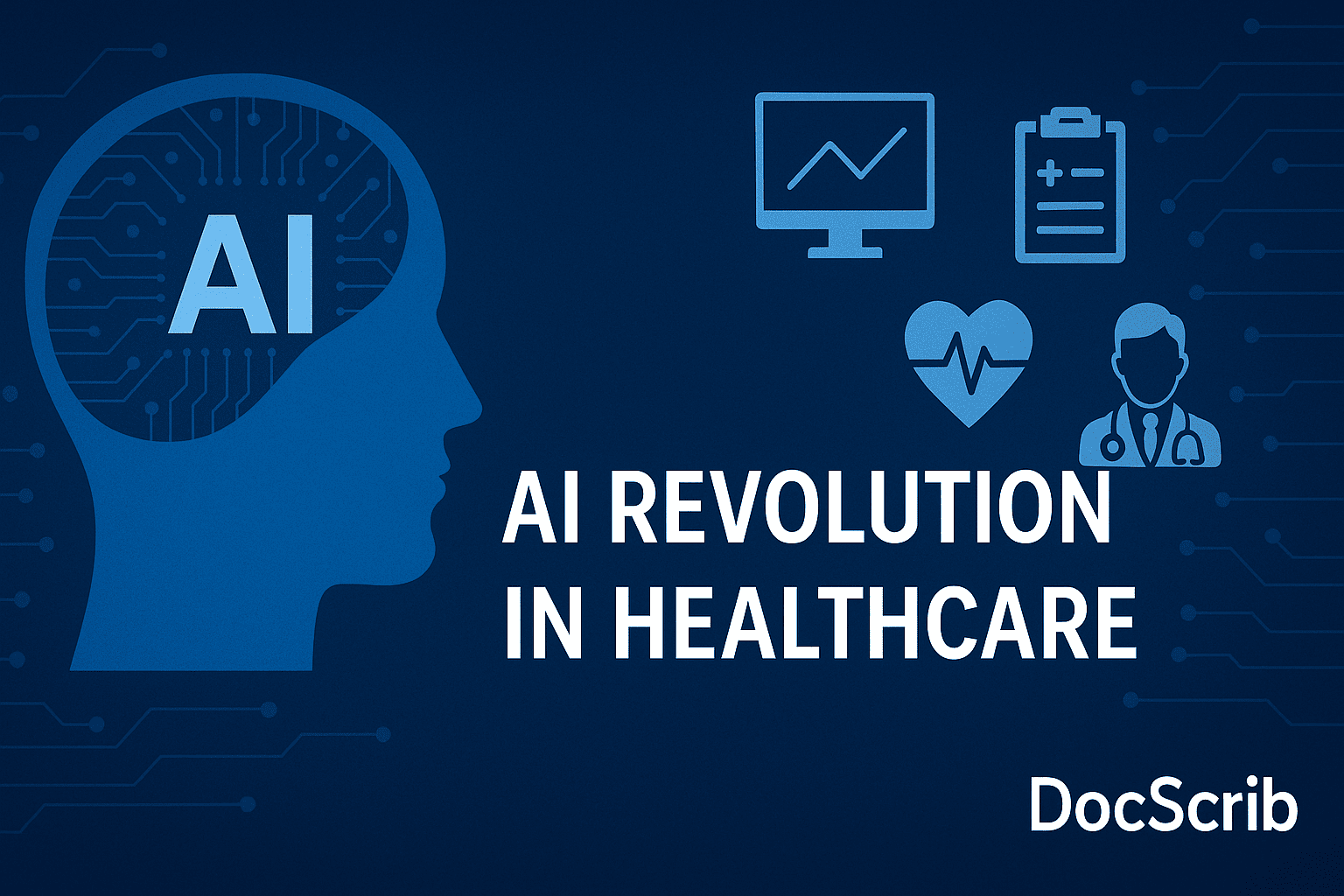Updated on: July 11, 2025
The healthcare industry is standing at the edge of a transformative revolution—and Artificial Intelligence (AI) is leading the charge. From AI medical scribes to predictive diagnostics and robotic surgeries, the AI revolution in healthcare is reshaping how care is delivered, how patients are engaged, and how clinicians work.
In this comprehensive guide, we’ll explore:
-
What the AI revolution in healthcare means
-
Key technologies driving change
-
Real-world applications like virtual medical scribes
-
The role of DocScrib in this transformation
-
How AI is enhancing both care quality and operational efficiency
👉 Discover how DocScrib is transforming clinical documentation with AI.
What Is the AI Revolution in Healthcare?
The AI revolution in healthcare refers to the rapid adoption of artificial intelligence technologies to:
✅ Improve patient outcomes
✅ Automate repetitive tasks
✅ Reduce costs
✅ Personalize care delivery
AI systems can learn from data, identify patterns, predict outcomes, and automate complex tasks—making healthcare more efficient, proactive, and patient-centric.
Key Technologies Powering AI in Healthcare
Here are some of the most transformative AI-driven technologies reshaping healthcare:
| Technology | How It’s Used in Healthcare |
|---|---|
| Natural Language Processing (NLP) | Powers AI medical scribes, patient communication, and documentation. |
| Machine Learning (ML) | Enables predictive analytics, personalized treatment, and diagnostics. |
| Computer Vision | Assists in radiology, pathology, and robotic surgery. |
| Robotic Process Automation (RPA) | Automates administrative tasks like billing and scheduling. |
AI in Action: Real-World Applications Transforming Healthcare
1. AI Medical Scribes
Clinicians spend nearly 50% of their time on documentation. AI medical scribes, like DocScrib, automate note-taking by:
-
Listening to patient-clinician conversations
-
Generating structured, accurate clinical notes
-
Integrating seamlessly into Electronic Health Records (EHRs)
This not only saves time but reduces physician burnout and enhances patient focus.
👉 See how DocScrib can help your practice.
2. Virtual Medical Scribes
In some settings, virtual medical scribes (human scribes working remotely) are still used. However, AI scribes are now replacing them due to:
✅ Greater speed
✅ Lower cost
✅ Higher data security
✅ Scalability
3. AI in Diagnostics and Imaging
AI tools assist radiologists by:
-
Detecting anomalies in X-rays, MRIs, and CT scans
-
Providing decision support for faster, more accurate diagnosis
4. AI in Population Health Management
AI analyzes massive datasets to:
-
Identify at-risk populations
-
Guide preventive care initiatives
-
Reduce hospital readmissions
5. AI in Administrative Efficiency
AI reduces manual work by automating:
-
Insurance claims processing
-
Appointment scheduling
-
Revenue cycle management
The Benefits of the AI Revolution in Healthcare
| Benefit | Impact |
|---|---|
| Improved Patient Outcomes | Faster diagnosis, personalized care, and better chronic disease management. |
| Operational Efficiency | Reduced administrative burden, fewer errors, and cost savings. |
| Enhanced Clinician Well-Being | Less time on paperwork = reduced burnout and higher job satisfaction. |
| Patient Engagement | AI chatbots, remote monitoring, and telemedicine create a seamless experience. |
The Role of AI Medical Scribes in the AI Revolution
At the heart of this transformation is the urgent need to free up clinicians from time-consuming documentation.
DocScrib, an AI-powered medical scribe solution, is helping healthcare providers:
✅ Eliminate hours of EHR charting
✅ Generate accurate, structured clinical notes in seconds
✅ Integrate smoothly with major EHR systems
✅ Stay HIPAA-compliant and secure
👉 Learn more about DocScrib’s AI-powered scribe technology.
Overcoming Challenges: Barriers to AI Adoption in Healthcare
Despite the promise, AI adoption still faces hurdles:
| Challenge | Solution |
|---|---|
| Data Privacy & Security | Strong encryption, HIPAA compliance, and transparent AI. |
| Integration with Legacy Systems | Open APIs and modular design (like DocScrib offers). |
| Trust & Explainability | Clinician oversight, transparent AI models, and education. |
Healthcare organizations must build trust and ensure patient safety while embracing AI.
The Future of AI in Healthcare
Looking ahead, we can expect:
-
Predictive Care: AI identifying issues before they arise.
-
Voice-Driven EHRs: Fully hands-free clinical documentation.
-
AI-Powered Clinical Decision Support: Augmented intelligence helping doctors make better choices.
The AI revolution will make healthcare smarter, faster, and more human-centered—with clinicians empowered by technology, not burdened by it.
Key Takeaways
✅ The AI revolution in healthcare is already here, transforming every facet of the industry.
✅ AI medical scribes like DocScrib are a cornerstone of this change, helping clinicians save time, reduce burnout, and improve care.
✅ Successful adoption hinges on seamless integration, security, and ease of use.
👉 Ready to bring AI-powered documentation to your practice? Schedule your demo with DocScrib today and join the healthcare revolution.
